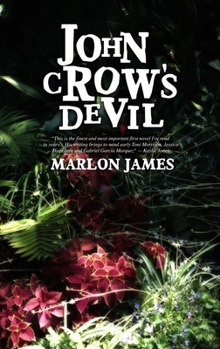John Crow's Devil
Select Format
Select Condition 
Book Overview
--Marlon James won the 2015 Man Booker Prize for his third novel, A Brief History of Seven Killings.
--Finalist for the Los Angeles Times Book Prize and the Commonwealth Writers' Prize
"A powerful first novel . . . Writing with assurance and control, James uses his small-town drama to suggest the larger anguish of a postcolonial society struggling for its own identity." --New York Times, Editors' Choice
"Elements coalesce in a Jamaican stew spicier than jerk chicken. First novelist James moves effortlessly between lyrical patois and trenchant observations . . . It's 150-proof literary rum guaranteed to intoxicate and enchant. Highly recommended." --Library Journal, Starred Review
This stunning debut novel tells the story of a biblical struggle in a remote Jamaican village in 1957. With language as taut as classic works by Cormac McCarthy, and a richness reminiscent of early Toni Morrison, Marlon James reveals his unique narrative command that will firmly establish his place as one of today's freshest, most talented young writers.
In the village of Gibbeah--where certain women fly and certain men protect secrets with their lives--magic coexists with religion, and good and evil are never as they seem. In this town, a battle is fought between two men of God. The story begins when a drunkard named Hector Bligh (the "Rum Preacher") is dragged from his pulpit by a man calling himself "Apostle" York. Handsome and brash, York demands a fire-and-brimstone church, but sets in motion a phenomenal and deadly struggle for the soul of Gibbeah itself. John Crow's Devil is a novel about religious mania, redemption, sexual obsession, and the eternal struggle inside all of us between the righteous and the wicked.
Customer Reviews
A Truly Revealing Look At Mid-20th-Century Jamaica.
Awesome!
I Couldn't Put It Down
Brilliant on many levels
Jamaican Country Life
John Crow's Devil Mentions in Our Blog

Yesterday the shortlist of 6 finalists for the 2015 Man Booker Prize for fiction were announced. There is one debut novelist in Chigozie Obioma, but other than that the list is made up of known quantities. Here are some thoughts.
Marlon James has made it to the shortlist for the first time, continuing a prolific hit rate after John Crow's Body was a finalist for the LA Times Book prize and his The Book of Night Women also became a finalist in the 2010 National Book Critics Circle award.





